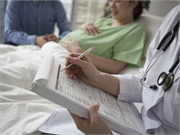THURSDAY, May 21, 2020 (HealthDay News) — Some pregnant women with COVID-19 do become severely ill, and the risk may be elevated for those who were obese or had conditions like asthma before pregnancy, a new study suggests.
As with all things COVID-19, researchers have had limited information on whether pregnancy puts women at any greater risk of severe illness — or whether infection complicates pregnancy.
There is still a lot to learn, experts said. But the new study, reporting on 46 pregnant women in Washington state, begins to give some insight.
“The advance of this study is, we have over 40 women with symptomatic COVID-19, and we know what happened to them,” said senior researcher Dr. Kristina Adams Waldorf, a professor of obstetrics and gynecology at the University of Washington in Seattle.
Most of the women had milder cases, but nearly 15% developed more severe breathing problems. All were hospitalized, and one woman who had asthma ended up in the intensive care unit.
In nearly all cases, the women were overweight or obese before pregnancy, and half had asthma or other conditions such as high blood pressure.
“So the same risk factors for severe COVID-19 that we’ve been seeing in non-pregnant people are also surfacing in the pregnant population,” Adams Waldorf said.
She and her colleagues reported on the cases May 18 in the American Journal of Obstetrics & Gynecology.
Since the early days of the coronavirus outbreak, many pregnant women have been asking how the infection could affect them, according to Dr. Elizabeth Langen, who reviewed the findings. She specializes in high-risk maternal-fetal medicine at the University of Michigan’s Von Voigtlander Women’s Hospital in Ann Arbor.
But doctors have had limited information to answer those questions — including whether the coronavirus carries any greater risk for pregnant women. With influenza, for example, it’s known that pregnant women are more likely than non-pregnant people to develop complications; and the infection can raise the risk of preterm labor.
Langen said the new report — what doctors call a case series — is “a good start” in learning more.
But, she said, it cannot give a sense of the prevalence of severe COVID-19 among pregnant women in the general population.
Of the 46 pregnant women who tested positive for SARS-CoV-2, the coronavirus that causes COVID-19, 43 were tested because they had symptoms. Nearly 15% developed breathing problems that landed them in the hospital.
“That’s 1 in 8,” Adams Waldorf said, “which to me is high.”
Pregnancy itself puts some degree of stress on the lungs, she explained. If a woman is also obese, or has an underlying health condition like asthma, that adds further stress.
Another big question is whether having COVID-19 during pregnancy can affect the baby. Of the women in this report, eight gave birth during the study period. That included two women who had a cesarean section, in part, to relieve their breathing difficulties.
That, Adams Waldorf said, shows the illness can affect the timing of delivery.
The risk of moms-to-be passing the virus to the fetus is a “still evolving” area of research, Langen added.
Last week, Canadian doctors reported on a newborn that likely became infected with the coronavirus while still in the womb. The good news is that baby was born healthy and did not develop COVID-19.
For now, Adams Waldorf said that pregnant women should take the recommended steps to protect themselves from infection: Stay home as much as possible, practice social distancing when they do go out, and wash hands frequently.
She also recommended that women opt for telemedicine visits when possible, especially if they are obese or have underlying health conditions.
As for childbirth in the midst of the pandemic, Langen said hospitals are “working hard to make labor and delivery safe.”
Some, including the University of Washington, are also screening women for SARS-CoV-2 when they arrive for delivery.
Last month, doctors at two hospitals in New York City — the epicenter of the U.S. outbreak — reported on their initial findings: Testing showed that 1 in 7 women who delivered between March 22 and April 4 had the coronavirus infection. But most — 88% — had no symptoms.
More information
The U.S. Centers for Disease Control and Prevention has advice for women who are pregnant or breastfeeding.
Copyright © 2026 HealthDay. All rights reserved.

